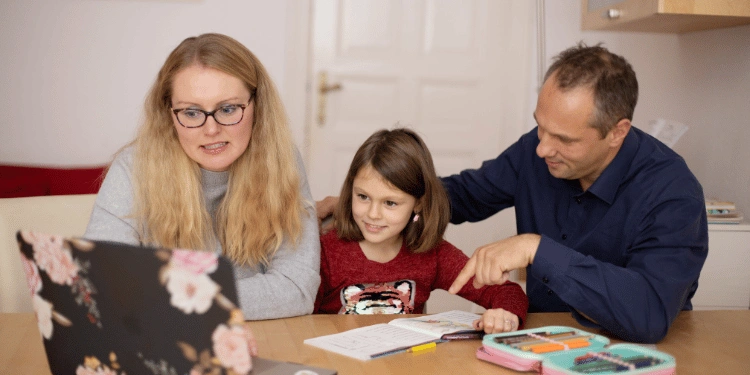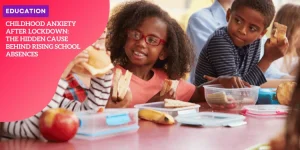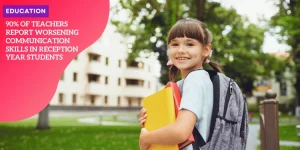Breaking News: UK Education Secretary Unveils Digital Tool to Boost Children’s School Preparedness
Introduction to the School Readiness Initiative
Education Secretary Bridget Phillipson has unveiled a new School Readiness website designed to aid parents in preparing their children for school.
This digital resource aims to close the gap between what parents believe constitutes school readiness and what schools actually require.
The focus is particularly crucial for children born during the lockdown, often referred to as ‘Covid babies,’ who might experience unique readiness challenges.
Supporting Parents
The School Readiness website developed in partnership with Kindred Squared, alongside input from schools and parents, offers comprehensive guidance.
It zeroes in on basic yet critical life skills including using the toilet, putting on coats, and recognising their names.
Arriving at school equipped with these foundational abilities helps ease the transition and sets children on a path towards educational success.

Bridging Expectations and Requirements
This initiative is part of the broader government effort to ensure every child has a fair start.
By aligning parental expectations with actual school requirements, the website assists families in understanding and preparing for the demands of schooling.
This comprehensive approach not only addresses immediate readiness challenges but also lays the groundwork for long-term academic and social benefits.
The emphasis on early preparation recognises the importance of getting children ready before they enter the school environment.
Through resources that are both practical and accessible, the initiative supports parents in ensuring their children are equipped to thrive from their very first day of reception.
The Concerning Gap in School Readiness
Disparity Between Parents and Teachers
A recent survey reveals a troubling disparity in perceptions of school readiness.
While 90% of parents believe their children are prepared to start school, teachers report that only one-third actually meet the necessary requirements.
This gap highlights a significant misunderstanding among parents about what constitutes school readiness.
Some parents may be unfamiliar with the concept altogether.
Ignorance of essential skills, such as using the toilet independently, indicates a need for better information and resources to support these crucial milestones.
Fundamental Skills Lacking
Concerns have arisen about children’s basic skills. “Worryingly, a significant number of individuals struggle with basic tasks such as climbing stairs or putting on their own coats.
This lack of physical independence poses a challenge for teachers tasked with aiding these children in basic daily activities.
The website introduced by Education Secretary Bridget Phillipson aims to address these deficiencies, offering resources to help parents teach these essential skills.
Addressing the Needs of ‘Covid Babies’
Children born during the Covid-19 lockdowns, often referred to as ‘Covid babies,’ face unique challenges.
Isolation during critical developmental stages has left them less equipped for school.
This initiative seeks to fill that gap and ensure these children are not left behind.
While these disparities and challenges might seem daunting, they underscore the importance of the School Readiness initiative and the digital resource designed to bridge this gap.
Next, we will explore the key features of this new digital resource and how parents can utilise it to better prepare their children for school.
Key Features of the New Digital Resource
The new digital resource, developed by Kindred Squared in collaboration with schools and parents, is designed to bridge the gap between parental expectations and school requirements.
It addresses significant school readiness disparities, particularly for children born during lockdown, referred to as ‘Covid babies’.
The resource covers four essential categories: growing independence, building relationships and communication, physical development, and healthy routines.
Growing Independence
This section emphasises helping children develop self-sufficiency.
Practical advice includes teaching children how to use the toilet independently, manage their clothing, and recognise their own names.
These skills are essential for children to navigate daily school life confidently.
Building Relationships and Communication
Fostering social skills is crucial for a child’s successful integration into the school environment.
The resource provides tips on encouraging turn-taking, sharing, and expressing emotions.
It also offers strategies for enhancing communication skills, which are vital for classroom interactions.
Physical Development
Physical activity is a key component of overall development.
The resource recommends at least three hours of daily activity for children. It also includes activities to improve fine motor skills, such as drawing and using cutlery, to help children perform tasks they will encounter in school.
Healthy Routines
Establishing healthy routines can significantly impact a child’s readiness for school.
This section provides guidance on setting consistent daily schedules, including brushing teeth twice a day and limiting screen time.
It aims to instil habits that promote a healthy lifestyle from a young age.
Each of these categories includes resources from expert organisations, offering practical steps for parents to integrate these skills into their child’s daily life.
This collaborative effort ensures that parents are well-equipped to prepare their children for the challenges of starting school.
This chapter transitions smoothly into the next discussed section: Essential Skills for School Success.
Essential Skills for School Success
Self-care Fundamentals
For children starting school, mastering basic self-care skills is vital.
This includes essential activities such as using the toilet independently, managing their coats, and maintaining personal hygiene.
Ensuring your child can confidently handle these tasks will make their school transition smoother.
Toilet training should begin well before school starts, focusing on both cleanliness and independence.
Helping children learn to independently put on and remove their coats is a key developmental milestone.
This can be turned into a fun activity to build their confidence.
Social Development
Developing social skills is equally important for school success.
Promote sharing and taking turns during play, while guiding children to express their emotions in a constructive way.
These interactions foster a sense of empathy and cooperation, which are essential in a classroom environment.
Families can create opportunities for children to engage with peers, fostering communication skills.
Role-playing and group activities can be particularly beneficial in building these social foundations.
Physical Abilities
Children should be physically active for at least three hours each day, engaging in activities that improve both gross and fine motor skills.
Simple activities like climbing stairs, drawing, and using cutlery can significantly enhance their physical development.
Encourage a routine that includes varied physical exercises and activities, making sure these are fun and engaging to maintain your child’s interest.
This balance of exercise and skill-building will prepare them for the physical demands of school life.
By focusing on these key areas, parents can proactively prepare their children for a successful start to their educational journey.
Government’s Broader Educational Vision
The School Readiness initiative is a cornerstone of the government’s ambitious ‘Plan for Change,’ aimed at ensuring that every child in the UK receives the best start in life.
This comprehensive plan isn’t limited to mere digital resources; it incorporates additional support measures to create a holistic educational environment.
Free Breakfast Clubs and Expanded Access to School-based Nurseries
One critical element of this vision is the introduction of free breakfast clubs.
These clubs are designed to provide children with the nutritious start they need each morning, thereby enhancing their capacity to focus and engage in learning activities once they arrive at school.
This initiative targets children from all backgrounds, ensuring equitable access to essential resources.
In addition, the government’s initiative aims to broaden the availability of nursery services within schools.
By increasing the availability of these nurseries, the aim is to boost early childhood education, giving children the foundation they need to succeed academically and socially as they progress through their education journey.
Increasing Development Levels by the End of Reception
The overarching objective of the government’s initiative is to substantially increase the number of children achieving a good level of development by the end of their reception year.
This goal underscores the importance of early childhood education and the necessity for children to start school with the skills and confidence required for success.
By focusing on key developmental milestones, the government aims to improve educational outcomes and enhance future prospects for all children.
This multifaceted strategy reflects the government’s dedication to creating an inclusive and supportive educational system.
Their aim is clear: to build a foundation upon which every child can thrive academically and personally.
Building upon this broader educational strategy, the government is also fostering unprecedented collaboration across various educational organisations, ensuring a unified approach to defining and achieving school readiness.
Unprecedented Collaboration in Early Years Education
Unified Definition of School Readiness
For the first time, leading educational organisations have come together to create a unified definition of ‘school readiness’.
This collaborative effort is groundbreaking and pivotal in setting clear expectations for when children start reception.
The new definition covers four crucial categories:
- ️Growing independence
- ️Building relationships and communication
- ️Physical development
- ️Healthy routines
Each category is backed by a plethora of resources and practical tips from expert organisations to help parents seamlessly weave these skills into their child’s daily routines.
Sharing the Digital Resource Nationwide
Schools and nurseries across the UK are united in their mission to share this invaluable digital resource with millions of families.
The new School Readiness website, developed by Kindred Squared, enables parents to access practical advice and guidance, ranging from teaching children to manage personal hygiene to fostering social skills like turn-taking and sharing.
This unprecedented collaboration ensures that no parent feels left in the dark when it comes to their child’s educational journey.
Expert Perspectives on Home-School Alignment
Experts highlight the importance of aligning home and school expectations to give children a robust start to their educational experience.
According to Education Secretary Bridget Phillipson, “giving every child the best start in life begins long before they walk through the school gates”.
This sentiment underscores the long-term benefits that stem from an early focus on school readiness, ensuring that children not only thrive in reception but also build a solid foundation for future learning and achievement.
The seamless collaboration between parents, schools, and expert organisations promises to forge a comprehensive and inclusive approach to early childhood education, setting up children for success in every facet of their lives.
Impact and Future Outlook
The introduction of the School Readiness website marks a significant step in enhancing children’s preparedness for school and life beyond.
Long-term benefits from early educational support are manifold, potentially shaping children’s educational journey and their outcomes later in life.
This proactive approach helps to set children on a path of development, fostering essential skills that serve them well through their schooling years and beyond.
Monitoring Progress through Developmental Milestones
Tracking the progress of school readiness is crucial.
The initiative aims to support parents and educators in monitoring developmental milestones effectively.
By observing and measuring children’s achievements during the reception year, parents and teachers can identify areas where further support may be needed.
This continuous cycle of monitoring and support ensures that children not only meet academic benchmarks but also develop holistically.
Building Foundations for the Government’s Ambition
The government’s broader ambition to create ‘the best education system in the world’ hinges significantly on enhancing school readiness.
By focusing on foundational skills, such as independence, communication, physical development, and healthy routines, the initiative strives to give every child the best possible start.
Evolving these basic skills into lifelong habits and competencies can build a stronger, more capable future generation.
The collaboration amongst educational organisations establishes a unified vision of school readiness, fostering alignment between home and school expectations.
The nationwide sharing of digital resources ensures an inclusive approach, reaching millions of families and standardising readiness benchmarks.
The “Plan for Change” supports this vision by implementing additional measures like free breakfast clubs and expanded school-based nurseries.
With each child receiving the necessary foundations before they start school, the prospect of achieving a good level of development by the end of reception grows ever more attainable.






